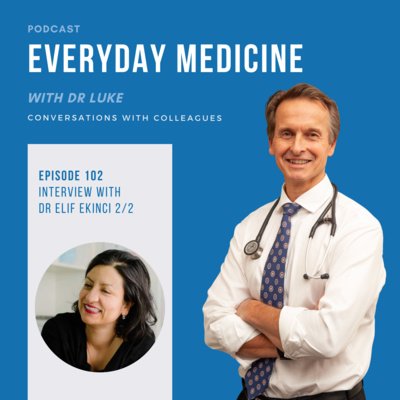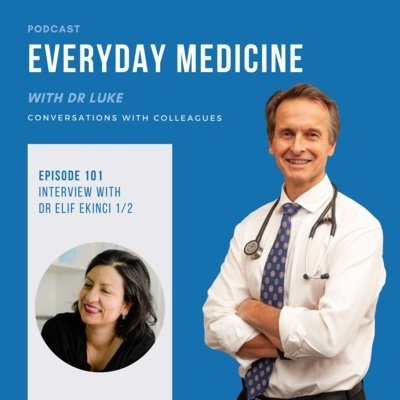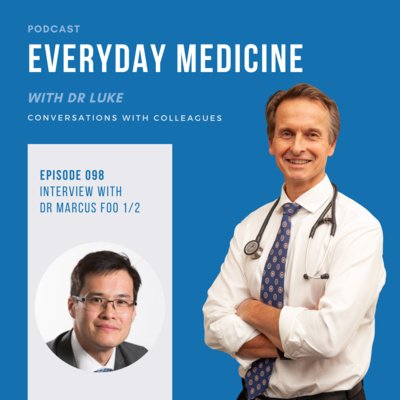Everyday Medicine by Dr Luke Crantock
Conversations with colleagues providing helpful ideas and advice in healthcare
Episode 110. Recurrent UTI with Dr Tony Amin
Urinary tract infections are one of the top twenty reasons patients present, for primary care. According to Kidney Health Australia, 1 in 2 women and 1 in 20 men will develop a urinary tract infection in their lifetime. Approximately 4 in 10 women who develop a UTI will have at least one more infection in the next 6 months. Furthermore, 4% of patients in residential care develop recurrent UTIs, which is defined as 3 infections in a 12-month period or 2 or more in a 6-month period (including cystitis and pyelonephritis).
Episode 109. Medicolegal matters - How to avoid them with Mr Rocky Ruperto
A patient approaching a doctor expects medical treatment with all the knowledge and skill that the doctor possesses, to bring relief to his or her medical problem. The relationship takes the shape of a contract. Equally, a doctor owes certain duties to his patient and a breach of any of these duties gives a cause of action for negligence against the doctor. As doctors, we have a duty to obtain prior informed consent from the patient, before carrying out diagnostic tests and therapeutic management. We also need to clearly document our conversations, investigations, and procedures. Communication, consent, and documentation are the big three issues that tend to permeate most medical claims.
Episode 108. Multiple Myeloma with Dr Jeremy Er
The term Multiple Myeloma was introduced in 1873 by von Rustizky when at autopsy he found 8 separate tumours of the bone marrow in a patient described as soft in consistency and reddish in colour and thence called “Multiple Myeloma”.
Episode 107. Fatty Liver and Fibroscans with Dr Michael Braude
Non-alcoholic fatty liver disease has emerged as one of the more important clinical problems being faced by primary care clinicians and hepatologists and is estimated to affect 20-30% of our population. Closely linked to metabolic syndrome, insulin resistance and diabetes, an increasing prevalence of this condition mirrors the rising average BMI of western societies.
Episode 106. Hand, Wrist and Elbow Surgery with Jason Harvey
Functional hands and fingers are taken for granted until they are damaged by disease or injury. The hand is an incredibly complex structure tasked with fine motor skills as well as the power of grip. Its incredible sensory connections communicate to us the beauty of touch, and the importance of temperature and texture and serve as a vital link in our relationship with the world.
Episode 105. Rheumatology in the community with Dr Mirza Baig (Part 2)
Musculoskeletal disorders are a common cause of long-term disability and are estimated to make up about 15% of the workload of general practitioners. Joint pain specifically is also extremely common, especially as one ages. In one national survey, one-third of adults reported having joint pain within the past 30 days. Knee pain was the most common complaint followed by shoulder and hip pain.
Episode 104. Rheumatology in the community with Dr Mirza Baig (Part 1)
Musculoskeletal disorders are a common cause of long-term disability and are estimated to make up about 15% of the workload of general practitioners. Joint pain specifically is also extremely common, especially as one ages. In one national survey, one third of adults reported having joint pain within the past 30 days. Knee pain was the most common complaint followed by shoulder and hip pain.
Episode 103. Fecal Occult Blood Test (FOBT) with Professor Finlay Macrae
Colorectal cancer is one of the most common cancers diagnosed in Australia with about 15,500 cases reported last year accounting for 10% of all new cancer diagnoses. Death from colorectal cancer at about 5300 yearly ranks only second behind lung cancer and accounts for about 10% of all cancer deaths in Australia highlighting the importance of its early detection and treatment.
Recognising these critical statistics the National Bowel Cancer Screening Program (NBCSP) was conceived and commenced in 2006 and by 2019 all Australians aged between 50 and 74 years were invited to participate in biennial faecal occult blood test screening for human haemoglobin using an immunochemical methodology as a surrogate marker of more serious internal colonic disease.
Episode 102. What's new in Diabetes with Dr Elif Ekinci (Part 2)
In the last 12 months, 121,000 Australians were diagnosed with diabetes, this statistic represents a 7% increase from the preceding year. There are now over 1.236 million Australians with type 2 diabetes and over 129,000 with type 1 diabetes and about 50,000 Australians have gestational diabetes each year -these staggering figures mean that 332 new diagnoses occur each day, about one new case every 5 minutes.
In respect to type 2 diabetes, the metabolic syndrome secondary to the obesity epidemic would appear to be a major contributor to new diagnoses. Australia ranks 6th highest amongst OECD countries (Organisation for Economic Cooperation and Development) in relation to its overweight and obese citizen with 67% characterised as overweight or obese (36% overweight, 31% obese).
Episode 101. What's new in Diabetes with Dr Elif Ekinci (Part 1)
In the last 12 months, 121,000 Australians were diagnosed with diabetes, this statistic represents a 7% increase from the preceding year. There are now over 1.236 million Australians with type 2 diabetes and over 129,000 with type 1 diabetes and about 50,000 Australians have gestational diabetes each year -these staggering figures mean that 332 new diagnoses occur each day, about one new case every 5 minutes.
With respect to type 2 diabetes, the metabolic syndrome secondary to the obesity epidemic would appear to be a major contributor to new diagnoses. Australia ranks 6th highest amongst OECD countries (Organisation for Economic Cooperation and Development) in relation to its overweight and obese citizen with 67% characterised as overweight or obese (36% overweight, 31% obese).
Episode 100. Central Australian Aboriginal Congress with Dr Sam Heard
The provision of healthcare to our indigenous population provides both a privilege and a challenge for administrators, doctors, nurses and allied healthcare workers. For most of us living far away in metropolitan centres, comfortably ignorant and sheltered from these very real challenges we can only begin to imagine the cultural sensitivities, demands and clinical problems at hand.
Episode 99. Radiation Oncology with Dr Marcus Foo (Part 2)
Radiation oncology occupies a very important place in cancer therapy as an essential member of the multidisciplinary approach to cancer treatment . Of the near 146 000 Australians diagnosed with cancer each year is estimated that about half would benefit from radiation therapy as part of their overall cancer treatment.
Radiation therapy is a highly cost-effective cancer therapy contributing only about 10% of each healthcare dollar spent on treating cancer overall yet vital in about 40% or cancers that are cured. The technology employs ionising radiation that causes the ejection of an orbital electron which is the molecular event leading to damage and eventually cell death. The radiation used may be either electromagnetic in nature using photons or gamma rays or particulate- directing a stream of electrons, protons or other atomic particles to the target and causing DNA damage to both normal tissue and tumour cells. Cells are most susceptible in the G1 and G2 phases which represent growth and preparation for mitosis as well as the mitosis phase referred to as the M phase. Additionally, hypoxic cells are thought to be less susceptible to radiation than well-oxygenated cells as free radicals formed by ionising radiation are more easily repaired in the absence of oxygen.
Episode 98. Radiation Oncology with Dr Marcus Foo (Part 1)
Radiation oncology occupies a very important place in cancer therapy as an essential member of the multidisciplinary approach to cancer treatment . Of the near 146 000 Australians diagnosed with cancer each year is estimated that about half would benefit from radiation therapy as part of their overall cancer treatment.
Episode 97. Hippocrasy with Dr Rachelle Buchbinder
In the September 25-26 edition of the weekend Australian magazine, I was drawn to a very interesting feature article reviewing the book Hippocrasy co-written by Professor Rachelle Buchbinder who is a rheumatologist as well as director of the Monash Cabrini Department of musculoskeletal health and clinical epidemiology at Cabrini Hospital and Professor of clinical epidemiology at Monash University with Ian Harris who is an orthopaedic surgeon at Liverpool St George and Sutherland hospitals and Professor of Orthopaedic surgery at the University of New South Wales Sydney and Honorary Professor at University of Sydney. The article was confronting in that it raised concerns that many of the medical procedures and treatments we are engaged with as clinicians may not help patients and that over diagnosis and the “medicalisation of normal” may be leading to a medical system failure.
Episode 96. Regenerative Medicine with Dr Kiryu Yap
The field of regenerative medicine is likely to significantly change how we practice medicine in the future with some amazing capabilities -harnessing the power of stem cells to restore form and function of damaged tissue. The potential of regenerative medicine has already being recognised in the areas of immunotherapy and bone marrow transplantation however the future is likely to see many further shining examples of its promise ,application and capability. Consider the possibility of injecting cardiac stem cells into the surrounding viable ventricular myocardium adjacent to an acute myocardial infarction providing functioning myocardial cells to restore cardiac output or indeed replacing a damaged organ such as a cirrhotic liver allowing restored hepatic synthetic function.
Episode 95. Remote and Rural Medicine with Dr Etienne Cawood
The Doctors, nurses, paramedics and hospital staff working at remote locations must be capable of dealing with a wide range of medical, surgical, obstetric, paediatric and psychiatric conditions that may present as emergencies. Where support help such as tertiary transfer may be hours or days away it takes a special team to come together to manage such difficulties. It was a great pleasure to interview Etienne Cawood who has spent the majority of his medical career working in rural and remote locations throughout the length and breadth of Australia and we him great debt gratitude for his services.
Episode 94. Being an intern during COVID with Dr Nick Shearer
The journey from the VCE student to University and medical studies is highly competitive and never easy and for those undertaking a postgraduate degree in medicine, the graduate medical school admissions test-GAMSAT-designed to assess the capacity to undertake high-level intellectual studies in the medical and health professional programmes provides yet a further hurdle. Dr Nick Shearer completed his postgraduate medical studies at Deakin University before choosing and being accepted as an intern at the Northern Hospital Epping. In his dream of becoming a doctor he was immediately thrust into the incredible difficulty of not only managing the brutal responsibilities of internship but even more the harsh reality of coping with the COVID-19 pandemic at the very interface between disease and treatment in a hospital tasked with frontline COVID-19 responsibilities. Donning personal protective equipment for the entire year and honing his communication skills with often frustrated and frightened patients and their relatives Nick has become a shining example of how good our medical personnel and profession can function and be in a time of deep crisis.For his insights please welcome Dr Nick Shearer to the conversation.
Episode 93. Haemotology with Dr Thomas Lew (Part 3)
In this three-part series we will explore common haematological abnormalities including anaemia, polycythaemia, the basis for neutropenia, neutrophilia, lymphopenia and lymphocytosis as well as thrombocytopenia and thrombocytosis.
Episode 92. Haemotology with Dr Thomas Lew (Part 2)
In this three-part series we will explore common haematological abnormalities including anaemia, polycythaemia, the basis for neutropenia, neutrophilia, lymphopenia and lymphocytosis as well as thrombocytopenia and thrombocytosis.
Episode 91. Haemotology with Dr Thomas Lew (Part 1)
In this three-part series we will explore common haematological abnormalities including anaemia, polycythaemia, the basis for neutropenia, neutrophilia, lymphopenia and lymphocytosis as well as thrombocytopenia and thrombocytosis.




















